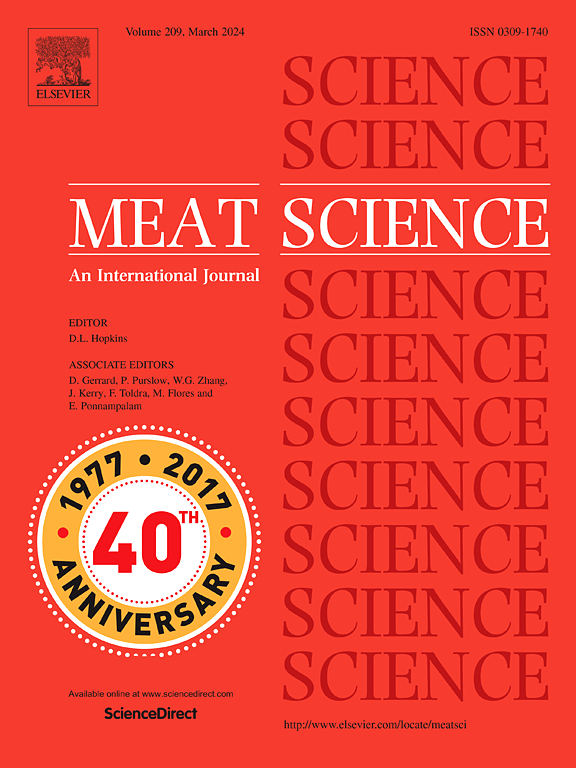Anti-clostridial effects and technological properties of nisin against Clostridium sporogenes in nitrite-reduced heat-treated Turkish-type dry fermented sausage (sucuk)
IF 7.1
1区 农林科学
Q1 Agricultural and Biological Sciences
引用次数: 0
Abstract
Clostridium spp. poses a significant problem in meat sausages, particularly semi-dry fermented meat products, during storage. The present study evaluated the anti-clostridial effects of nisin (0.05–0.1 %) and mixed lactic acid bacteria (LAB) cultures (Lactiplantibacillus plantarum, Lactococcus lactis subsp. lactis) on Clostridium sporogenes endospores in vacuum-packaged, nitrite-reduced heat-treated Turkish-type dry fermented sausage (sucuk). Also, it examined the effect on the products' technological properties and microbiological safety over a 45-day storage period at 4 °C. The reduction in total spore-forming bacteria (TSFB) and anti-clostridial efficacy were determined using 0.05 % nisin in nitrite-reduced sucuk and 0.1 % nisin in nitrite-free sucuk, indicating a significant interaction between treatment and storage day (P < 0.001). The combination of 150 ppm sodium nitrite (NaNO₂) and 0.05 % nisin in nitrite-reduced sucuk resulted in the lowest thiobarbituric acid reactive substances (TBARS) values (P < 0.001). Furthermore, using 150 ppm NaNO₂ and 0.1 % nisin in nitrite-free sucuk more effectively preserved the initial color values compared to the control group (P < 0.001). While reducing or removing NaNO₂ in heat-treated sucuk did not compromise safety regarding C. sporogenes endospores under the conditions tested, the antimicrobial role of NaNO₂ should not be disregarded. Therefore, 0.05 % nisin in nitrite-reduced sucuk is recommended to effectively inhibit C. sporogenes endospores and improve the oxidative stability of heat-treated Turkish-type dry fermented sucuk.
乳酸链球菌素对亚硝酸盐还原热处理土耳其干发酵香肠(sucuk)中产孢梭菌的抑菌效果及工艺性能。
梭状芽孢杆菌在肉肠,特别是半干发酵肉制品的储存过程中造成了严重的问题。本研究评价了乳酸链球菌素(0.05- 0.1%)和混合乳酸菌(植物乳杆菌、乳酸乳球菌亚种)培养物的抗梭菌作用。真空包装、亚硝酸盐还原热处理的土耳其型干发酵香肠(sucuk)中的芽孢梭菌内生孢子。此外,它还研究了在4°C下45天的储存期对产品技术性能和微生物安全性的影响。用0.05%的乳酸链球菌素和0.1%的乳酸链球菌素分别测定了亚硝酸盐还原液中总芽孢形成细菌(TSFB)的减少和抗梭菌效果,表明处理和储存时间之间存在显著的相互作用(P
本文章由计算机程序翻译,如有差异,请以英文原文为准。
求助全文
约1分钟内获得全文
求助全文
来源期刊

Meat Science
工程技术-食品科技
CiteScore
12.60
自引率
9.90%
发文量
282
审稿时长
60 days
期刊介绍:
The aim of Meat Science is to serve as a suitable platform for the dissemination of interdisciplinary and international knowledge on all factors influencing the properties of meat. While the journal primarily focuses on the flesh of mammals, contributions related to poultry will be considered if they enhance the overall understanding of the relationship between muscle nature and meat quality post mortem. Additionally, papers on large birds (e.g., emus, ostriches) as well as wild-captured mammals and crocodiles will be welcomed.
 求助内容:
求助内容: 应助结果提醒方式:
应助结果提醒方式:


